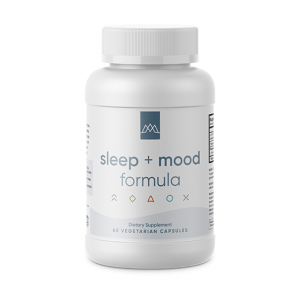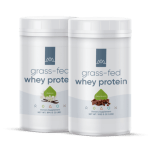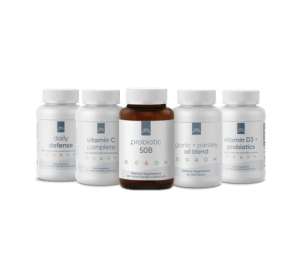Cold and Flu Symptoms Sneak Up On Us
- Cold vs Flu: What Do You Have?
- How to Get Rid of a Cold: Do Cold Medicines Work?
- Managing Common Cold & Flu Symptoms: A Different Approach
- 10 Ways to Naturally Eliminate or Minimize Cold and Flu Symptoms
The alarm goes off at 6:30 a.m. and that feeling immediately hits you. Your breathing is stuffy, you’re coughing, and your forehead feels warm. You’re coming down with a cold or possibly the flu.
“I’ll drink a few cups of coffee and take some cough medicine along with ibuprofen to ease my symptoms,” you tell yourself. “Today will be tough, but I’ll get through it.”
That’s standard thinking when you feel a cold or the flu coming on. Unfortunately, suppressing cold and flu symptoms with over-the-counter cough and cold medicines often does more harm than good.
Cold vs Flu: What Do You Have?
Knowing whether you have a cold or the flu can help you determine the best course of action to heal.
Influenza (more often called the flu) and the common cold are respiratory illnesses created by different viruses. Many symptoms of a cold or flu overlap, so determining which you have based on symptoms might be difficult. Oftentimes, flu symptoms are more severe than cold symptoms.
Symptoms of a cold depending on your immune system strength, but typically start one to three days after you get infected and last around three to seven days. Flu symptoms are more intense and include fever, chills, cough, sore throat, runny or stuffy nose, achiness, headaches, and fatigue.
While colds and their symptoms don’t often result in serious health problems, the flu can. Most people will get better within a few days to less than two weeks. For others, the flu can create life-threatening complications including pneumonia.
While everyone has a risk for the flu, certain demographics are more at risk with its potentially life-threatening symptoms including older people, pregnant women, young children, and those with chronic medical conditions.
Please see your doctor if cold or flu symptoms last more than a few days, become worse or create potentially life-threatening situations. Never modify or discontinue any medication or other instructions your physician advises.
How to Get Rid of a Cold: Do Cold Medicines Work?
Visit any drug store and you’ll find countless formulas, all promising fast, effective relief. For more severe symptoms or a cold or flu that sticks around beyond a few days, your doctor might also prescribe medications. Unfortunately, many cold medicines can have adverse or minimal results:
- Antihistamines combined with decongestants, analgesics, or both: They have a small to moderate effect on the common cold in older children and adults.
- Cough suppressants: Research shows that cough medicines don’t benefit children. For adults, the benefit is unclear but likely small. Norman Edelman, MD, senior scientific advisor at the American Lung Association, says we lack evidence that suppressants and expectorants help with coughing.
- NSAIDs and Tylenol: While non-steroidal anti-inflammatory drugs (NSAIDs) or acetaminophen (Tylenol) can relieve pain and fever in people with upper respiratory tract infection, they do not relieve other symptoms and can have adverse effects including gastrointestinal and cardiovascular problems.
- Antibiotics: Sometimes physicians prescribe antibiotics, yet they have no beneficial effect on the common cold. Antibiotics wipe out all your gut flora, which is bad news, considering about 70 percent of your immune system lies in the gut.
Overall, poor-quality, inconsistent evidence exists for the efficacy of cold medications to prevent and treat the common cold. While they might help a little, they could create adverse repercussions. Side effects include drowsiness, dizziness, blurred vision, upset stomach, nausea, nervousness, and constipation.
Never discontinue or modify any medication your doctor has prescribed without clear permission.
Managing Common Cold & Flu Symptoms: A Different Approach
While cold medicines can create some relief, those benefits come at a cost. You’re likely familiar with taking a cold medicine before going to work and feeling groggy, mentally unfocused, and generally off throughout the day. Your body has its own natural healing mechanisms when you get sick — your cold symptoms:
- Mucus helps get rid of dead bacteria and viruses.
- Coughing helps move the infection out of your lungs.
- Sneezing clears the airways of harmful irritants and allergy-causing substances.
- Fever is your body heating up to kill off the infection (the same way you heat food or water to kill off bacteria).
In other words, taking cold medicines and other suppressive formulas inhibits your body’s defense mechanisms so that it can’t fight back and might even prolong your cold or flu.
Consider coughing — it can disrupt a business meeting, exacerbate other symptoms like a sore throat, and become a red flag that you’re sick (and warns coworkers and friends to stay far, far away). Coughing sends more people to the doctor than any other specific symptom. We spend billions every year on over-the-counter medications like suppressants and expectorants to treat coughs.
A persistent cough can indicate many underlying problems including an allergy, a viral or bacterial infection, or gastroesophageal reflux disease (GERD). If your cough persists more than a few days or becomes worse, please visit your physician.
Taking a cough medicine interferes with the body’s efforts and ability to heal itself. Overuse can also be a problem. Maybe you combine cough medicine with another cold medicine even though both contain the same ingredients. Or you increase the dose to get a better effect, increasing your risk of overdose.
While some experts believe a fever should be suppressed with these medications, others argue running a fever is a protective adaptive response that should be allowed to run its course under most circumstances. Several recent randomized controlled trials support this idea, sometimes called the “let it ride” philosophy.
In other words, when you let a safe (emphasis on safe) fever run its course rather than take fever-reducing drugs or cough suppressants, you actually support the body’s defense mechanisms. Using wraps or baths that cool the body can help naturally lower fever. Instead, many of us take a cough and cold medications that suppress these symptoms.
10 Ways to Naturally Eliminate or Minimize Cold and Flu Symptoms
When it comes to the flu or common cold, prevention is the best medicine. Wash your hands frequently, support your immune system with the right dietary and lifestyle factors, and whenever possible, minimize exposure to sick people.
There’s a more natural, effective approach than medications. Whether you want to avoid whatever bug is going around your office or minimize the impact of a cold or the flu, these 10 strategies can optimize your body’s natural immune defenses.
1. Consider home remedies for a cold.
A Google search will yield many natural alternatives to coughs, sneezing, and other cold and flu symptoms. Gargling with warm salt water, for instance, can ease cold symptoms like a sore throat. “Nothing but time can cure a common cold, but a simple cup of salt water might ease the misery this winter,” writes Anahad O’Connor in the New York Times.
2. Eliminate immune-sabotaging foods.
There’s no debate — excess sugar is bad for your immune system, ramping up inflammation and increasing your risk for diseases including type 2 diabetes. Sugar and other food sensitivities like gluten can lurk in obvious and not-so-obvious places like almond milk.
3. Find your ideal weight to lower inflammation.
Obesity and inflammation can impair the immune system. The MaxLiving Core or Advanced Nutrition Plans can provide everything you need to attain and maintain a healthy weight.
4. Sleep well.
Optimal sleep levels support a healthy immune system, while sleep deprivation can compromise immunity. Aim for seven or eight hours of quality, uninterrupted sleep to minimize the common cold or flu. If you’re sick, additional sleep can strengthen your immune system. You can also use a tryptophan supplement to help regulate your sleeping habits.
5. Exercise consistently.
Regular exercise can support a healthy immune system. Make move more your mantra to support immune health and find strategies for quick, effective workouts. If you’re not feeling well, you should probably go easy on exercise, although light walking in fresh air could help you feel better.
6. Take Epsom salt baths.
A hot bath soothes achy muscles and other symptoms of cold and the flu. Add a cup of Epsom salt to your bath. Epsom salt is an excellent form of magnesium, which has a strong impact on the immune system. Many of us are deficient in this mineral. One review found that 75 percent of women consumed less than the Recommended Daily Allowances (RDAs) for magnesium.
7. Minimize stress levels.
One meta-analysis of over 300 studies spanning three decades concluded that stress can impact your immune system. You can’t eliminate stress, but you can create ways to reduce its impact. Find your bliss point and incorporate it regularly, whether that means yoga, meditation, deep breathing, or just watching a funny movie with your best friend.
8. Optimize your antioxidant defense.
Glutathione, your body’s master antioxidant, can fine-tune your immune response to infections including the common cold. Glutathione can also recycle other antioxidants including vitamins C and E. Hormone-free, grass-fed whey protein provides the precursors your body requires to increase glutathione production and optimize immunity. N-acetyl-L-Cysteine is a sulfur-containing amino acid that also helps build glutathione.
9. Visit your chiropractor.
A healthy immune system requires a healthy central nervous system. Ensuring the spine is free of subluxations, which interfere with the normal functioning of the nervous system, gives the body access to properly support a healthy immunity and minimize your risk for colds, the flu, and other viruses.
10. Utilize the right nutrients.
Certain nutrients can optimize immunity, including:
- Vitamin D: This vitamin — actually a hormone — can modulate the immune response, and deficiencies can increase your risk for infections.
- Zinc: Studies show this mineral can reduce the number of colds in children, and researchers see no reason why it cannot also work with adults.
- Probiotics: Supporting the immune system begin with the gut. A probiotic optimizes healthy microflora to keep colds and the flu at bay.
Feeling the symptoms of a cold or flu can make your day miserable. Instead of relying on over-the-counter medications, trust your body’s natural ability to heal. Those cold and flu symptoms are actually good for you — they mean your immune system is fighting off the infection.


